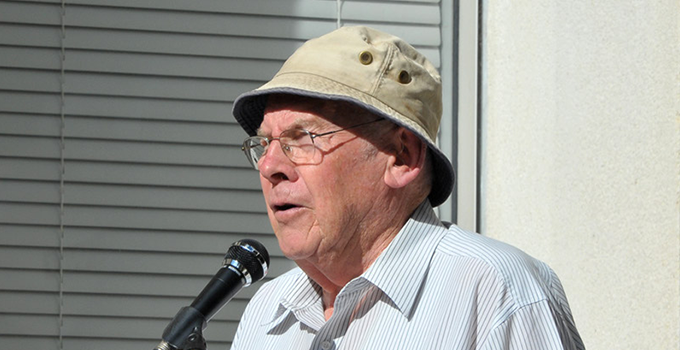Martin Bennett: One of the originals, now contemplating life after the RSC

In 1968 Professor Martin Bennett set sail for Australia, leaving his life in England to join a small burgeoning University that would soon become his new home.
“I came because I was offered a very good opportunity,” Martin explains. “I was at University College of London. I was quite happy there, but it was a little bit of a patriarchal system, and I really was feeling the need for a little bit more independence.
“I can't remember exactly how it happened, but I heard of a new school opening at the ANU, and I thought it might be worth applying. I went to see one of the professors at University College of London who was the Australian, David Craig, who was also coming out here. He advised me to apply. So I did, and I was successful.”
Canberra was completely different to Martin’s home of London.
“I mean, I can't really describe to you, how empty the place looked, the whole place, I don't mean actually the building itself, but it was practically standing in an open field. Canberra was like that as a whole. I can't remember, the population must've been only 40 or 50 thousand at that stage.”
But coming to ANU opened a range of research opportunities as well.
“At that stage, the ANU, and as it was then, the Institute of Advanced Studies, was the only place in Australia to which post-doctoral appointments could be made. So there was the opportunity of postdoctoral appointments, which I certainly wouldn't have had if I'd stayed at University College of London.”
“I got more freedom to run what I thought were interesting lines of research, and it seemed a better opportunity compared with where I was. It wasn't that we were particularly lavishly funded, because we weren't, but I had freedom to pursue what I thought was interesting.”
In doing so, Martin became a world leader in inorganic chemistry.
“Inorganic chemistry is a bit of a broad church. My subsection of it, was, broadly speaking, its interactions with organic chemistry. So I was interested in inorganic metallic chemistry. That's the chemistry of organic compounds attaching to metal atoms, usually through carbon atoms.”
Martin has worked on a range of projects in this field throughout his career. One of the highlights was working on the Wilkinson’s catalyst.
“Just before I came out here, at University College, we had actually independently discovered Wilkinson's catalyst. And in fact, I was collaborating with an ICI on the applications and the structure of this catalyst. But I sort of gave that away when I discovered that Wilkinson was working on it, and I didn't really want to compete with him.”
“However I continued to work on this separately when I came out here. Wilkinson's catalyst contains the element Rhodium. I was interested, for various reasons, in seeing if we could make the Iridium analogue. You look at the periodic table, Iridium sits just below Rhodium. They're very closely related but although, obviously not the same. But there's a point of interest in trying to see what the differences are.
“And that I was successful in doing. It was a very competitive. I mean, I was worried whether even Wilkinson himself would discover the Iridium compound, but it was not so obvious how it would be made. The Rhodium one's fairly easy to make. The Iridium one's not so easy.”
While Martin no longer has a research team at the RSC, he still comes in regularly, working on a few ongoing projects.
“I'm still here like a shag on a rock, so to speak. I have a collaboration with a group headed at RMIT in Melbourne, and I also collaborate with a group in Japan. I have tried in the time I have been here, to collaborate with other groups. And so, the work, obviously it's finishing up now, but I've kept that going.
“I really only need one more year, actually. I won’t cut myself off though. Some people prefer to cut themselves off completely from the subject. I don't like doing that, although I must admit, you can't do everything. It's just impossible. But I still try and keep an interest in the subject.”
When Martin finally finishes he intends to throw himself more fully into his other new passion – teaching at The University of the Third Age.
“I began to learn German in school in England, and I always enjoyed it, and I more or less kept it going. I actually spent two periods of study leave in Germany, so I got to speak it readily. I'm not saying it's perfect, but it's good enough.
“So, I started doing a U3A class. I took it as a pupil and then the lady who ran the course decided she couldn't keep it going, and wanted other people to take it over, and nobody volunteered, so I did it. It takes a lot of time, but I think I’ll continue that when I’m finished here.”
